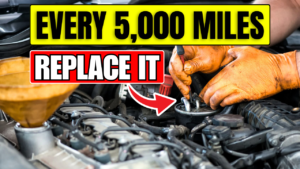Six Proven Habits to Help Your Car Surpass 500,000 Miles Trouble-Free
Does the idea of driving your car for half a million miles sound impossible? It’s not! With the right habits, you can keep your car running smoothly far beyond what most drivers achieve. Whether it’s daily driving habits or consistent maintenance routines, ensuring the longevity of your vehicle is all about showing your car some TLC.
If you’re ready to keep your car on the road and out of the repair shop, we’ve compiled six proven habits that will not only extend your car’s life but also save you money on costly repairs. Here’s how to make your car a mileage champion!
Why Longevity Matters for Your Car
Cars today are built to last longer, but that doesn’t mean they will magically reach 500,000 miles trouble-free without consistent care. By incorporating the habits below, you’ll not only save money on repairs but also reduce environmental waste by avoiding premature vehicle replacements.
These habits focus on essential practices, from proper maintenance schedules to smarter driving techniques, so you can keep your vehicle reliable for the long haul.
Routine Oil Changes
Oil is the lifeblood of your engine. Neglecting oil changes can lead to sludge buildup, reduced engine efficiency, and even catastrophic damage over time. Changing your oil regularly helps maintain engine cleanliness, reduces friction, and ensures all moving parts are adequately lubricated.
How Often Should You Change Your Oil?
-
Check your manufacturer’s guidelines, but typically it’s between 5,000 to 7,500 miles for most modern cars using synthetic oil.
-
High-mileage or older vehicles may require more frequent oil changes.

Pro Tip:
Stick to high-quality synthetic oils designed for longevity, such as Valvoline’s High Mileage oil, to protect engines that go the distance.
Stay on Top of Transmission Maintenance
The health of your transmission can make or break the longevity of your car. Transmission problems are not only inconvenient but also expensive to repair. Maintaining clean transmission fluid and not delaying inspections is critical.
Key Practices:
-
Change your transmission fluid approximately every 60,000 miles or as recommended by your car’s manufacturer.
-
Avoid aggressive shifting and treat your transmission gently to prevent unnecessary wear.
By staying proactive, you can help your transmission perform optimally for hundreds of thousands of miles.
Maintain Your Cooling System
An overheated engine is one of the quickest ways to drastically shorten your car’s lifespan. The cooling system is designed to regulate engine temperature, preventing it from overheating. Regularly checking and replacing your coolant will ensure your system functions properly.
Cooling System Checklist:
-
Replace coolant every 50,000 miles or every five years.
-
Check hoses for leaks and cracks.
-
Flush the system to remove harmful buildups that can impact performance.
Taking care of your cooling system will spare you from expensive engine repairs while keeping your car running smoothly.
Keep Spark Plugs Fresh
Spark plugs are essential for igniting the air-fuel mixture in your engine and ensuring smooth combustion. Worn-out spark plugs can lead to misfires, poor fuel economy, and harder starts.
Replacement Guidelines:
-
Inspect spark plugs every 30,000 miles.
-
Replace them between 60,000 to 100,000 miles, depending on the manufacturer’s recommendation.
Pro Tip:
Consider high-quality iridium spark plugs for durability and better performance over time.
Replace Filters and Fluids Regularly
Filters and fluids are small yet vital components that play a crucial role in your car’s performance and longevity.
Essential Filter and Fluid Maintenance:
-
Fuel Filter: Replace every 50,000 miles to prevent contaminants from reducing fuel efficiency.
-
Air Filter: Replace every 15,000 to 30,000 miles to avoid airflow restrictions and ensure optimal engine performance.
-
Brake Fluid: Change every three to five years for reliable braking power.
Regularly checking and replacing these items will help your car run efficiently and avoid unnecessary strain on components.
Drive Smarter, Drive Longer
While car maintenance plays a massive role in your car’s lifespan, how you drive every day is equally important. Smart driving habits can prevent unnecessary wear and tear on your vehicle.
Safe Driving Habits:
-
Accelerate gently to reduce strain on your engine and transmission.
-
Avoid hard braking, as it wears down brake pads and rotors prematurely.
-
Maintain a steady speed, especially on highways, to improve fuel efficiency and decrease stress on the engine.
Driving with care doesn’t just extend your car’s life; it also makes your rides safer and smoother.
Additional Tips for Long-Term Success
Aside from the six habits above, these bonus tips can make all the difference in ensuring your car hits that 500,000-mile milestone:
-
Rotate your tires every 6,000 to 8,000 miles and ensure they’re properly inflated to reduce uneven wear.
-
Inspect belts and hoses regularly for cracks or damage that could lead to overheating or poor performance.
-
Address minor issues as soon as they arise; small problems can escalate into major repairs if ignored.
Make High Mileage Your Reality
Getting your car to 500,000 miles trouble-free isn’t luck; it’s dedication. By following these six proven habits, you can significantly extend your car’s lifespan, reduce repairs, and save money over time.
Start small by focusing on one or two habits today, then build up your car care routine. Remember, every oil change, spark plug replacement, and smart driving habit brings you closer to the half-million-mile mark.
For additional tips and expert advice, join the Car Care Clues community to learn directly from experienced mechanics. Whether you’re a seasoned car owner or just starting out, their guidance will help you keep your car running like new for decades to come.
Happy driving!
